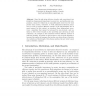27 search results - page 2 / 6 » Oblivious Transfer with a Memory-Bounded Receiver |
EUROCRYPT
2007
Springer
14 years 1 months ago
2007
Springer
We study an adaptive variant of oblivious transfer in which a sender has N messages, of which a receiver can adaptively choose to receive k one-after-the-other, in such a way that ...
STOC
1999
ACM
13 years 11 months ago
1999
ACM
Oblivious polynomial evaluation is a protocol involving two parties, a sender whose input is a polynomial P, and a receiver whose input is a value α. At the end of the protocol t...
CRYPTO
2005
Springer
14 years 1 months ago
2005
Springer
Since bit and string oblivious transfer and commitment, two primitives of paramount importance in secure two- and multi-party computation, cannot be realized in an unconditionally ...
JOC
2007
13 years 7 months ago
2007
This paper is about the Oblivious Transfer in the distributed model proposed by M. Naor and B. Pinkas. In this setting a Sender has n secrets and a Receiver is interested in one o...
CRYPTO
2006
Springer
13 years 11 months ago
2006
Springer
Abstract. We study unconditionally secure 1-out-of-2 Oblivious Transfer (1-2 OT). We first point out that a standard security requirement for 1-2 OT of bits, namely that the receiv...

